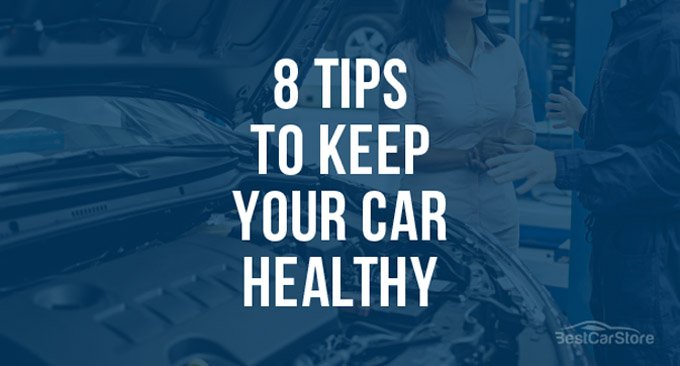8 Tips to Keep Your Car Healthy
December 22, 2021
Do you know how often you should check the health of your car? If you love your car you must know these 8 tips to keep your car healthy.
While you may not think that your car needs routine maintenance, it’s important to keep an eye on it regularly. A regular car check-up is vital to maintain the health of your vehicle. A professional mechanic does this, or you can do it yourself at home.
The key is to catch minor problems early. This will prevent major headaches later. A basic car check-up will cost around $50 – $100 and take about 15 to 30 minutes.
However, it is recommended to hire a professional mechanic if you have a costly model.
Table of Contents
8 Tips to Keep Your Car Healthy
1 – Diagnostic Test
Performing a diagnostic test is like a check-up for your body. It will help detect any potential problems and prevent expensive repairs. It will also save you from the hassle of being stuck on the side of the road with no way to get to work.
Some people may assume that a car health check-up is only necessary when the check engine light comes on. It’s not true. The more you know about your car, the better.
2 – Inspect the Lights
It’s important to inspect the lights and other components of your vehicle regularly. You should visually inspect your vehicle’s headlights at least once a month, and you should also test parking lights and turn signals.
To avoid driving with faulty brake lights, have a friend stand behind your car and check them. If there are any problems, it’s better to visit a mechanic than to risk an accident.
3 – Tire Pressure
It’s extremely important to check your tire pressure when it comes to your car’s overall health. You should have your tires inspected at least once a year.
It will keep your car from being able to roll on low-pressure tires. It is also an important part of your vehicle’s exhaust system. Your car tires should be balanced and your wheels aligned to ensure safety.
Digital Tire Pressure Gauge
4 – Must Check Seat Belts
You should check the belts in your car to see if they are loose. They should be replaced if they have become worn out.
They keep you safe while driving. In a crash, they can prevent fatalities by keeping the vehicle’s occupants inside. Having seat belts in your car means that your seat belt is restraining your body.
Another reason to make sure you’re always wearing seat belts is that they increase the chance of survival in a crash.
If you’re in the front seat, your chances of survival are increased, but there’s still a good chance that you’ll suffer a spinal cord injury. If you have a child in the car, you’ll want to make sure they’re also wearing their seat belts.
Besides saving lives, seat belts are also a necessary safety precaution.
5 – Radiator and Brakes
Some components of your car need regular maintenance, such as the radiator and the brakes. Other parts, such as the air filter, must be checked on a more regular basis.
If these components aren’t working, you should consider having a technician examine them. It is best to have a qualified professional perform these checks for you.
6 – Car Battery
A battery is the lifeblood of your car. You can test your car battery quickly with some basic tools.
The best way to test your car battery yourself is with a multimeter. Connect the multimeter to the positive (+) terminal and measure the voltage. If you can see the voltage, the battery is charging properly.
Next, check the voltage of the battery. A low voltage means the battery is weak and has already been sulfated. It may be a good idea to recharge the battery overnight so you can test its voltage the next day.
To be sure, test the battery while the car is in motion. Ask a friend or another person to help you test the battery’s function.
You can start the engine while holding the multimeter to the battery. If the voltage of your battery is too low, you should replace it.
7 – Car Coolant
Coolants are designed to prevent overheating of the engine. It is important to prevent your engine from overheating.
Without it, your engine would suffer severe internal damage. If you haven’t been aware, this fluid is responsible for transferring heat away from the engine.
This coolant is a necessity for your car. It absorbs and releases heat quickly to keep the engine’s temperature consistent. This prevents overheating and equalizes the temperature inside the hood.
Car Coolants help the engine run smoothly even in hot and humid weather. In cold weather, they prevent the engine from freezing. While these extreme temperatures may seem counter-intuitive, they can cause engine problems.
That’s why it’s essential to change your car’s coolant regularly.
8 – Suspension
It is also very important to check the condition of the suspension and the braking system. A proper suspension will ensure your car is in good working order.
In addition, a faulty steering system will cause severe problems in your vehicle.
Do You Know What to Do If Your Car Overheats on the Highway

[…] rybelsus 14 mg […]
[…] clomid 50 mg […]
[…] cialis price […]
[…] sildenafil 100mg blue pill […]
[…] sildenafil citrate 50mg tab […]
[…] cialis 20mg price […]
[…] ginseng root tea for stamina […]
[…] sildenafil 50 mg for sale […]
[…] 25mg viagra online […]
[…] order viagra 50 mg […]
[…] price of cialis 20mg tablets […]
[…] cost of 50mg viagra […]
[…] cialis lilly […]